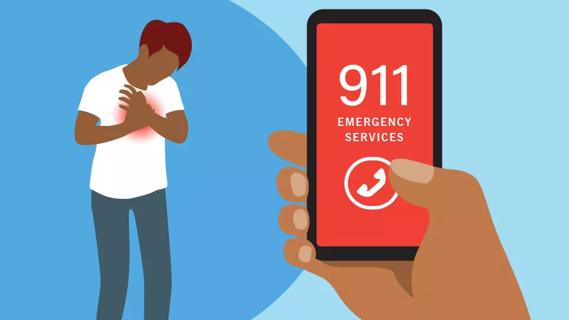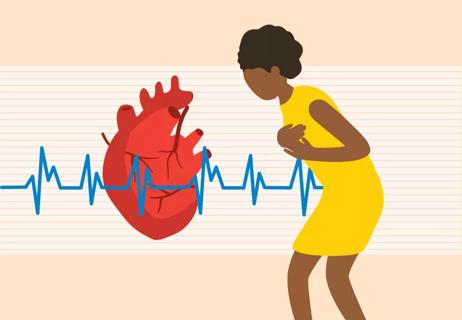The stress of a high-stakes game can trigger a heart attack in people who are at high risk

It’s the bottom of the ninth, the bases are loaded, and your heart is racing.
Advertisement
Cleveland Clinic is a non-profit academic medical center. Advertising on our site helps support our mission. We do not endorse non-Cleveland Clinic products or services. Policy
It’s fourth and goal, your guys are going for a touchdown with seconds left on the clock, and you can feel your pulse pounding in your neck.
You’re not imagining it. The stress of tuning in to the big game can do a number on your heart rate. And for sports fans at risk of a heart attack, all that stress can trigger a dangerous situation.
“When we get invested in something, including any major sporting event where our favorite team is competing, we can become hyper-focused and that can be stressful,” says cardiologist Nicholas Ruthmann, MD. “Your body’s response to that stress can lead to significant changes in blood pressure and heart rate. In some cases, it can even lead to a heart attack.”
We talked with Dr. Ruthmann about how root, root, rooting for the home team can increase your risk of a heart attack.
Research has suggested that cardiovascular events (aka heart attacks and sudden cardiac death) increase surrounding high-stakes games … and they don’t mean for the players on the field.
Anyone who’s ever been caught up in the excitement of a winner-take-all matchup knows the tension is palpable. Your hands sweat, you fear blinking in case you miss something, you lash out if your friend asks what you want on your pizza at a pivotal moment.
Advertisement
In other words, it’s stressful. And stress does a real number on your body.
When we feel stress, it’s often accompanied by a rush of adrenaline, which triggers our sympathetic nervous system (our “fight or flight” mode) to spring into action. It’s how your body prepares to defend itself from a threat. So, while you don’t actually have a 300-pound linebacker barreling down on you, your body is responding as if you do. Your pupils dilate, and your heart races to deliver more oxygen around your body.
That sudden fast-paced, extra-hard beating of your heart as it prepares for battle is a normal response to stress. For some people, that quickening of your heart can trigger a heart attack.
“For fans who are already at increased risk for a heart attack, a stressful game can be a perfect storm,” Dr. Ruthmann says.
Of course, stress in other situations — say, public speaking or a pressing deadline — can create a similar reaction. But for diehard sports fans, the stress response to a three-pointer at the buzzer may be about as heart-pounding as it gets.
The thrill of the win and the agony of defeat can take a serious toll on people who are living with an increased risk of a heart attack. That includes people who:
Couple those conditions with a tendency to over-indulge on alcohol and fatty foods during big games, and it’s a recipe for a major heart episode, Dr. Ruthmann says.
Dr. Ruthmann offers these tips to help protect yourself during that next major matchup:
“Try your best to manage your stress level and the excitement surrounding the big game, too,” Dr. Ruthmann advises. “During commercial breaks, go into another room, clear your head and take some deep breaths. After all, what do you think those pros you’re watching are doing between plays? Exactly the same thing.”
If you do feel symptoms of a potential heart attack, pause the game and seek immediate attention.
Symptoms can include:
Cheering for your favorite team can be a source of pride and give you a chance to get together with friends and family. It’s thrilling. It’s community-building. And … it’s stressful.
So, wear your team colors. Wave that big foam finger. High-five your buddies. But please, try to limit your stress. Pro athletes know the importance of staying healthy — take a play from their book.
Advertisement
Learn more about our editorial process.
Advertisement

Calling 911 or emergency services should always be your first step

Mild heart attacks may cause less damage, but they can still lead to serious complications and require medical attention

Congenital heart disease, genetic conditions and unhealthy lifestyle habits can put teens at higher risk for heart attack

Recognizing subtle symptoms, like cold sweats, stomach discomfort and nausea, could be the key to survival

Absolutely! In fact, in many ways, exercise is key to recovery

There’s no way to stop it once a heart attack is happening, but the most important thing you can do is to call for help

To help determine what you’re experiencing, focus on how the pain feels, the location of the pain, when it started and how long it lasts

Symptoms may be mild, but don’t be fooled — any heart attack is serious

If you’re feeling short of breath, sleep can be tough — propping yourself up or sleeping on your side may help

If you fear the unknown or find yourself needing reassurance often, you may identify with this attachment style

If you’re looking to boost your gut health, it’s better to get fiber from whole foods